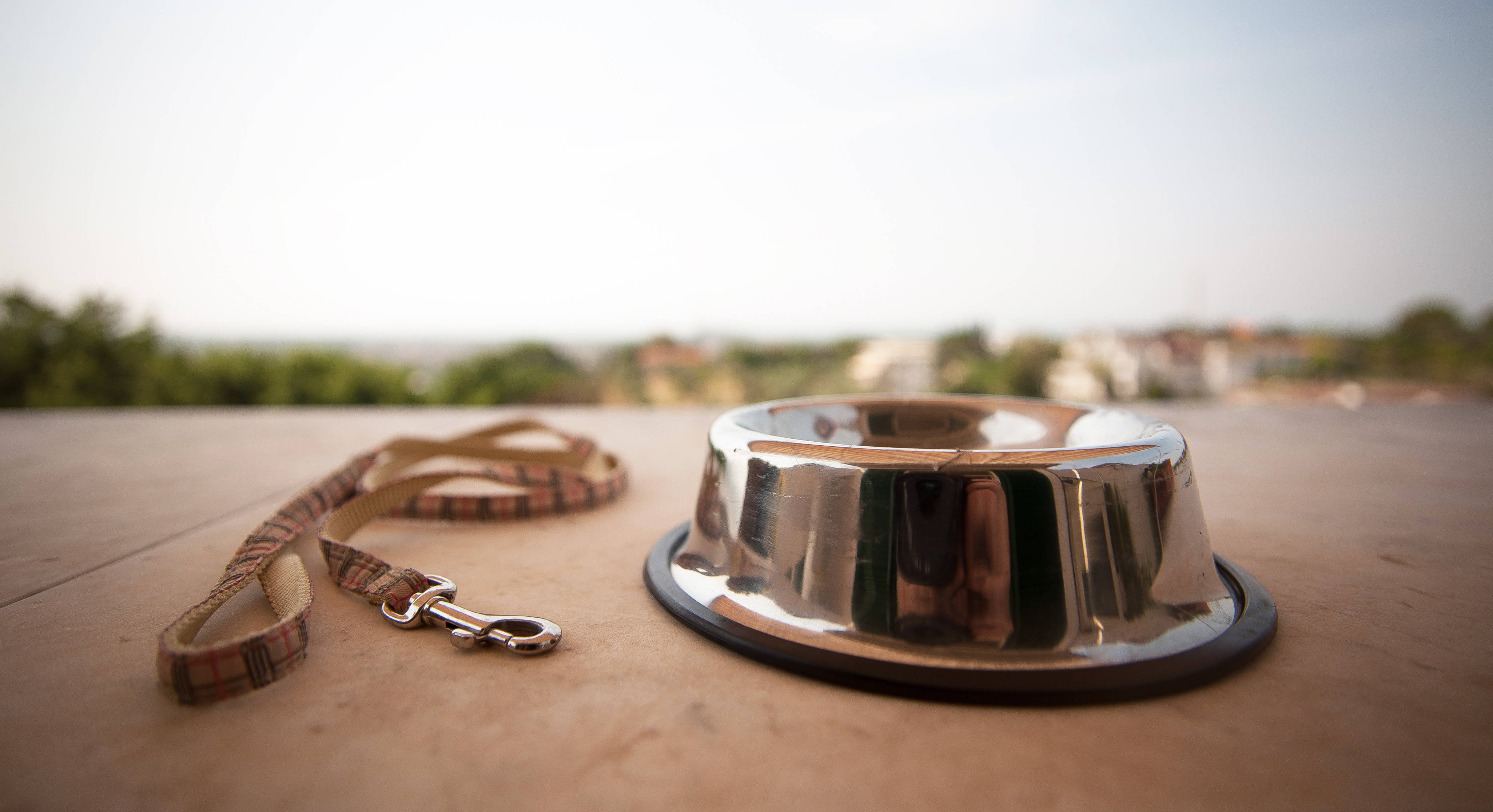
Coping with the loss of a pet
Posted by AK Lander | On January 17, 2019 15:43
We spoke to several pet grief counsellors about the stigma around pet bereavement as well as advice for coping with the loss.
Our pets aren’t just our furry companions, they are one of the family. So when the inevitable time comes that we have to say goodbye, it can leave us feeling lost and distraught. But just because they were a pet, that doesn’t mean you’ll be over their passing in a week, and neither does it mean you won’t grieve for them like you would any other member of your family.
To help overcome the stigma around pet bereavement, we spoke to several pet grief and support counsellors about pet loss and why it is something that needs to be spoken more openly about, as well as discussing advice for coping with the loss.
Grief after losing a pet is totally normal
For many, losing a pet is utterly heart-breaking. But when it comes to reaching out to others or facing your colleagues, sometimes it can feel as though your grief is over the top. But as our pet bereavement experts will explain, it is totally normal, and your feelings are valid.
“Times are changing,” says pet bereavement counsellor Carrie Ball. “People are more open to the idea that pet owners need support after they lose a beloved companion. Pets are family no matter the species. The bond is like no other, and there are people like myself out there that understand this.”
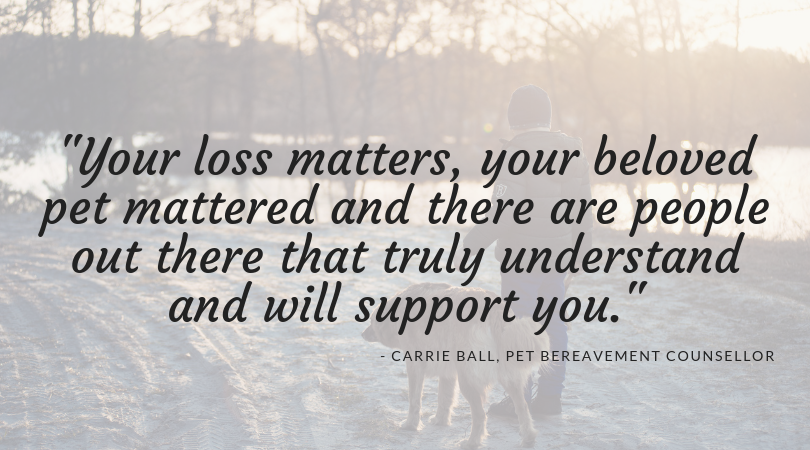
Speak to someone who understands
Don’t bottle up your feelings in fear of what others may think, says Carrie. Instead, reach out to others that do understand pet loss, whether that’s a friend, family member or even a group online. “You can join online pet loss support groups such as The Ralph Site, Pet Bereavement UK and others which can also be found online or on Facebook.
“Talk about how you feel. Your loss matters, your beloved pet mattered and there are people out there that truly understand and will support you.”
If you’re struggling to get it out, Carrie also suggests putting pen to paper. “Write down how you feel - it is surprising how much you can get out and down onto paper. It can be quite therapeutic.”
Your grief is valid, even when it’s over a pet
Rachel Symons is a pet bereavement counsellor from Brighton. She believes one of the biggest stigmas around pet bereavement is feeling as though you shouldn’t grieve for a pet more than a human. “Pet bereavement is totally normal. At the end of the day, it’s about the grief you experience when a beloved family member dies, fur or human. But quite often, people think you should grieve more for a human.
“So say your distant aunt, who you see every few years, passes away. It can feel as though you’re supposed to grieve more for her than your dog or cat that’s been a big part of your life and family for many, many years. But in reality, all the joy, experiences and memories you have with them are just as important as anything or anyone else in your family. It’s totally normal to grieve the loss of something you’ve loved with all your heart.”
Rachel also believes that more people should be compassionate to those who have recently lost a pet. “Many people still need to realise that grieving for a pet is just as painful as for a human, sometimes more so depending on the person’s circumstances. Maybe they lived alone, and their cat was all they had, or maybe they are elderly, and their dog was their only company.”
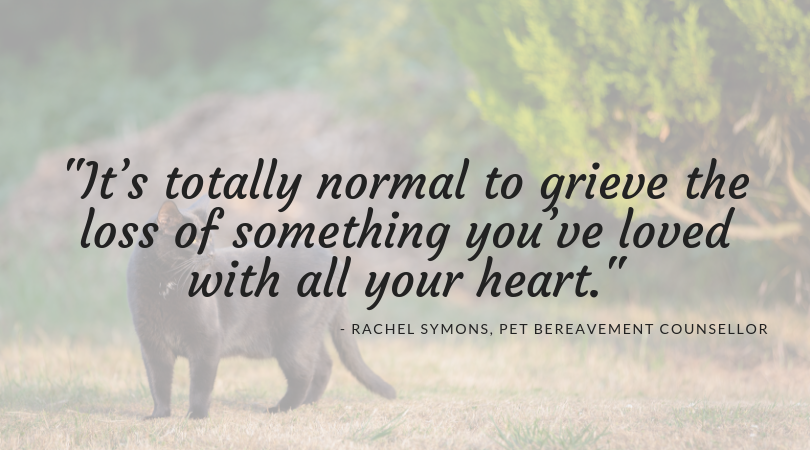
Don’t be afraid to seek professional help
“People need to understand it’s ok to seek help if you’re struggling with your grief,” says Rachel. “It can become complicated and people get ‘stuck’. Some get stuck in guilt, some in anger and so on. It’s important to work through this if you feel your grief cycle is not progressing normally.
“Many people won’t go to a normal counsellor for fear of appearing silly. If you do decide to seek a counsellor, find one who specialises in pet loss.”
Genevieve Merrett from Pet Loss Support South in Pulborough agrees with this, and also recommends seeking help in the instance that you know you don’t have long left with your pet as they can support you through the whole process.
But if you feel as though your grief is extreme, Genevieve definitely suggests visiting your GP. “We all react differently to a bereavement and grief affects us in different ways. Acknowledge this grief, but if you are grieving excessively, seek help from your GP.”
She also says to keep an eye on any of your other pets too, as they can also become affected by the loss. “If you have surviving pets and notice changes in their behaviour which concern you, seek veterinary advice.”
Move forward at your own pace
As well as acknowledging your grief, it is also important to take things as slow as you feel you need to.
“Don’t beat yourself up if you’re not ready to remove your pet’s bowls, toys and beds,” says Rachel. “A lot of my clients wait a while, as they have a fear of forgetting their pet or feel as though they are removing traces of them. There’s no need to rush this process - leave their belongings out for as long as you feel you want them there, as the time will come when you know you’re ready to remove them.”
When it comes to considering getting a new pet, Genevieve says there’s no right or wrong amount of time to wait. “With regards to acquiring a new pet, do not think there is any ‘correct’ timescale for doing so – or even acquiring one at all. Whatever feels right for you is the right thing to do.”
Above all else, Carrie says not to expect too much of yourself too soon. “No thoughts of ‘I should be over this by now’, ‘I’m being silly, my pet wouldn’t want me to be sad’. By thinking that your grief is a burden, or something to be pushed aside and forgotten about is unhealthy. Grief needs to be worked through.”
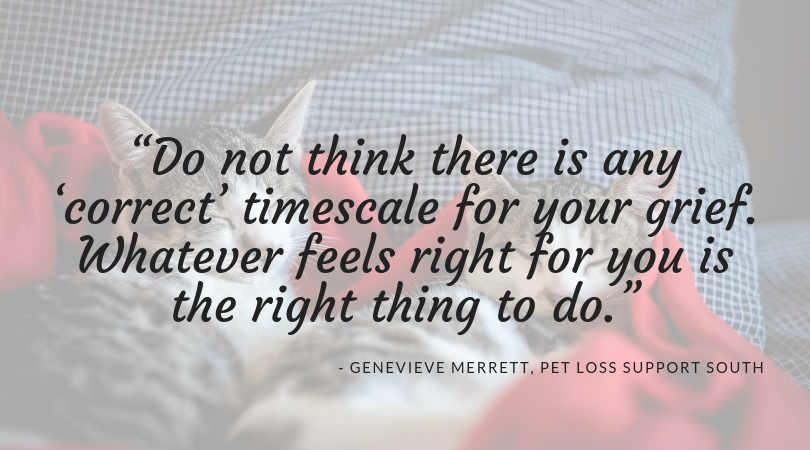
Acknowledge your feelings and emotions
Jamie Forster from Akeso Counselling in Cheshire understands the range of emotions that come with losing your pet. “You can expect to feel many emotions, including anger, guilt, denial, and depression, all of which are completely natural reactions to grief. However, there are things you can do to overcome these negative emotions and move from deep-felt sorrow to a place of acceptance.
“Do not deny your feelings, it is natural to feel a genuine sense of loss after something you love so much is not there anymore. Make sure you give yourself some compassion. If you have lost something so special it is likely to hurt, so above all else, be kind to yourself.”
Although it’s important to process your feelings, Rachel says not to punish yourself with ‘what ifs’. “It’s normal to question over and over if you did the right thing for your pet - did I take them to the vet soon enough? Why didn’t I notice they were sick? All sorts of things.
“Take each day as it comes, as every day will be different. Don’t be hard on yourself if you felt better and have since slipped back into crying. Grief is like a stormy sea we have to cross to get to the other side. There’s no time limit either - everyone’s grief is unique to them.”
Dealing with the decision to have your pet put to sleep
“When we have to make the decision to allow the vet to perform euthanasia we often feel very guilty, as if we are giving up or being hasty,” says Carrie. “However, we know deep down that we wouldn’t have even entertained the thought if we didn’t believe the time had come.
“Speak to the vet about the decision, they will advise the best course of action, and like you, they do not want your pet to suffer. It goes against everything they stand for.”
Carrie also suggests discussing with your vet how and when you want your pet to be euthanised. “You can come to an agreement between yourselves regarding whether it is done at home, or the clinic, whether you are present or not and whether you wish your pet to have sedation or not.” That way, you have a little more comfort and control over the situation.
As well as receiving support from your vet, there are others out there that can help, says Carrie. “There are helplines and pet bereavement counsellors who you can talk to before and after your pet passes. They will listen to you and support you.”
Although it can leave you feeling guilty and to blame, Carrie says you need to go easy on yourself. “Just remember you made the kindest most selfless decision. It is not cruel, it is not giving up. Your pet trusts you to be their voice, their advocate. You would not want them to suffer and so we have to break our hearts to save them. You did what was best for your beloved pet, not what was easiest.”
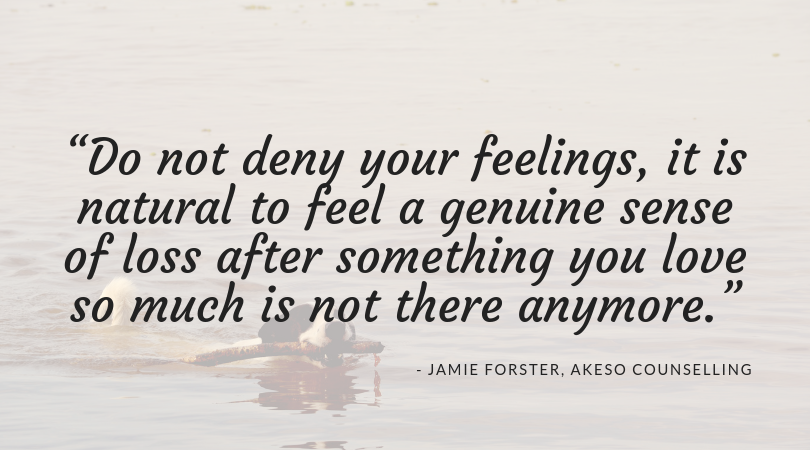
Remember your beloved pet with a memorial
If you feel it would help you in your grief process, Rachel suggests getting a memorial to remember your pet. “Some people get photos enlarged, some put ashes in a chain. One of my clients actually did this as she hated leaving the house as she felt she was leaving her dog behind. As crazy as this may sound, it really helped her, which just goes to show how different things work for different people.”
Other pet memorial ideas include memory boxes, pawprint casts and prints, portraits and cremation keepsakes.
“Above all else, just remember there is no right or wrong way to grieve the loss of an animal friend,” says Rachel. “Do what feels right for you and don’t compare yourself to anyone else. It’s your grief and your grief alone. Everyone copes differently.
“Think of all the happy memories you shared with your beloved fur friend, and just know that one day you will smile again.”
With over 150 years’ experience, AK Lander boasts a long, distinguished and successful history in the memorial and masonry business, including UK headstones. For more information contact us today.
